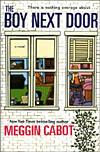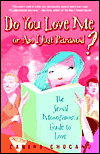
Comment
on this story
|
 |

Two new books puzzle out dating and boys
by Julia Watts
From Bridget Jones to Carrie Bradshaw, the urban single gal has become an object of both fascination and chuckling pity. Meggin Cabot, author of The Princess Diaries, jumps on the single-gal lit bandwagon with her first novel for grownups, The Boy Next Door ($13.95/Harper Collins).
Although Cabot's heroine Melissa ("Mel") Fuller shares both an address (New York) and a profession (newspaper columnist) with Sex and the City's Carrie Bradshaw, Mel is more down-home than the urbane Carrie. A small-town girl from Illinois, Mel drinks beer instead of Cosmopolitans, and when she splurges on shoes, they're Nine Wests instead of Manolo Blahniks. urbane Carrie. A small-town girl from Illinois, Mel drinks beer instead of Cosmopolitans, and when she splurges on shoes, they're Nine Wests instead of Manolo Blahniks.
Like other fictional single gals, though, Mel is an expert at wittily bemoaning her unattached state. In an email to the Human Resources director at the newspaper office, she argues that singlehood should be granted disability status: "Are you saying that my chronic status as a single woman is not worthy of assistance? Do I have to tell you how demoralizing it is to buy Lean Cuisine Fiesta Meals for One every night at the Food Emporium?"
While Cabot's protagonist resembles other single heroines, the novel's structure explores less familiar territory. A new-fangled epistolary novel, The Boy Next Door is constructed entirely of emails to, from, and about Mel. The plot that unfolds over the course of this correspondence is a mixture of romance, farce, and mystery.
When Mel's elderly neighbor, Mrs. Friedlander, is hospitalized, Mel looks after the old lady's pets. She contacts Max Friedlander, her neighbor's nephew, for help, but he turns out to be a first-rate heel, a shallow fashion photographer who can't take time from cavorting with supermodels to care for his aunt's pets. To avoid this responsibility without getting written out of the old lady's will, Max enlists the help of his old college buddy John Trent. John poses as Max and moves into Mrs. Friedlander's apartment, and in a plot twist that would surprise only non-earthlings, Mel and John fall in love. The requisite wacky hijinx ensue as the pair work to overcome their case of mistaken identity.
The Boy Next Door is as gooey and insubstantial as a Krispy Kreme doughnut, and at its best moments, is as much of a guilty pleasure. John describes Mel's writing style as "sprightly" and "pithy," words which describe Cabot's style as well. While Mel's self-pity about her singlehood and her best friend's angst about her weight grow a bit tiresome, attacking a romance novel for its lack of feminism is like criticizing a Krispy Kreme for its lack of vitamins. If you wanted something substantial, you should have looked elsewhere in the first place.
The novel's email format basically works, although it feels contrived sometimes, especially when Mel and her best friend, who works in the same office, engage in lengthy emailed conversations. Don't these women ever talk face to face?
Also, the characterization via email of some of the supporting cast could be stronger. Mel's snickerdoodle-baking, advice-dispensing mom and the cartoonishly shallow Max Friedlander never rise above stereotype. And Brittany and Haley, John's second-grader nieces, display implausibly good spelling and paragraphing in their emails.
Ultimately, The Boy Next Door is saved by its likable heroine and lighthearted tone. Fans of the "urban single gal" genre might find it an enjoyable diversion while they wait for the next season of Sex and the City.
Those who can't stand froth in their coffee, let alone in their books, should enjoy the espresso-like bitterness of Carina Chocano's Do You Love Me or Am I Just Paranoid? ($9.95, Villard). Subtitled "The Serial Monogamist's Guide to Love," Chocano's tome is the antithesis of most self-help books. In her introduction she writes, "Is there advice contained in this book? Yes, but  it's terrible...Serial monogamy is now the norm. Consequently, there's no reason to keep looking at it as some kind of repetitive failure pattern. Maybe we should just start regarding it as a flower pattern or paisley." Dr. Phil probably would not be amused, but I was. it's terrible...Serial monogamy is now the norm. Consequently, there's no reason to keep looking at it as some kind of repetitive failure pattern. Maybe we should just start regarding it as a flower pattern or paisley." Dr. Phil probably would not be amused, but I was.
While Chocano makes it clear from the get-go that the whole book is a joke, she is still more perceptive about the decline of commitment in relationships than many more high-minded authors. In the chapter "Things to Do on a Date—If, In Fact, That's What This Is," Chocano observes that since modern folk never ask each other on actual dates, instead opting "...to go with something like, 'We should get our dogs together,'" it's easy to be confused about whether or not one is actually dating. In these commitment-wary times, Chocano writes, even living together is a "non-committal commitment."
Do You Love Me or Am I Just Paranoid? is often laugh-out-loud funny. Readers who can't stomach the fairy tale fluff of The Boy Next Door might do well to ascribe to Chocano's philosophy: "Someday your prince will come. And if he doesn't, some other dude will. In the meantime, why not milk the drama for all it's worth?"

March 12, 2003 * Vol. 13, No. 11
© 2003 Metro Pulse
|